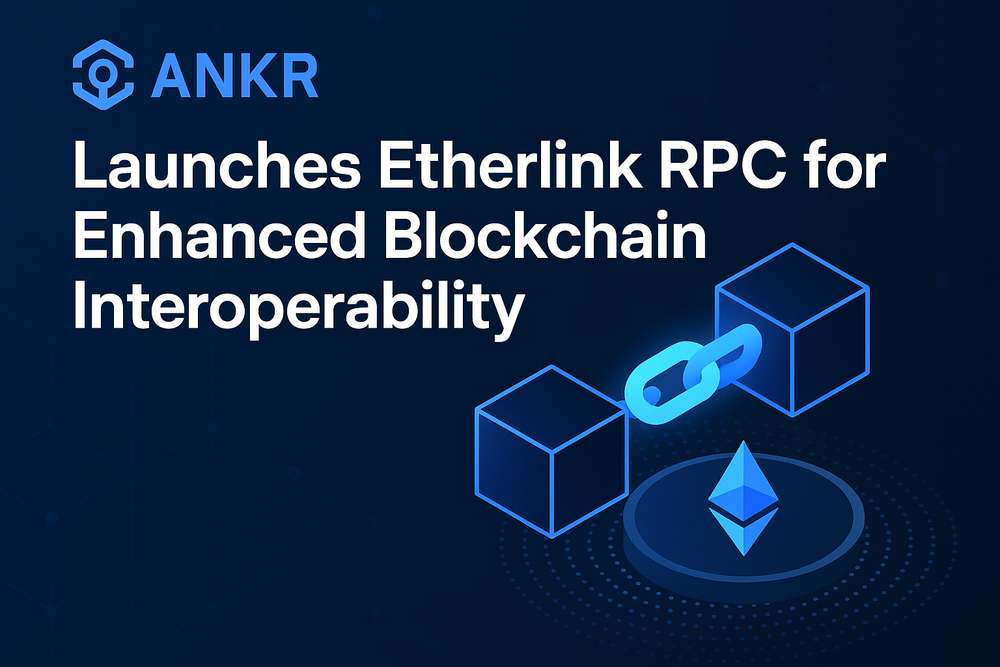Ankr, a number one Web3 infrastructure supplier, has formally launched Etherlink RPC, a brand new service designed to streamline blockchain interactions for builders and decentralized purposes (dApps). This growth marks a major step in Ankr’s mission to democratize entry to blockchain infrastructure, enabling seamless integration with Ethereum and different EVM-compatible chains. The launch follows Ankr’s latest participation within the Ethereum Neighborhood Convention (EthCC) in Cannes, the place its model director highlighted the significance of scalable infrastructure options.
As a part of its broader technique to help Web3 adoption, Ankr continues to broaden its suite of instruments, together with delegated staking and sidechain-as-a-service options. The corporate’s infrastructure now powers over 2,000 validators throughout main chains like Ethereum, Polygon, and Avalanche, reinforcing its place as a important participant in decentralized node provision.
Ankr’s Infrastructure Ecosystem
Ankr’s platform supplies builders with RPC endpoints, API entry, and staking companies, all designed to scale back the complexity of constructing on blockchains. The brand new Etherlink RPC service builds on this basis, providing high-speed, dependable connections to Ethereum’s mainnet and testnets. This aligns with Ankr’s aim of decreasing limitations to entry for builders, notably these focusing on EVM-compatible chains like Polygon and Arbitrum.
Etherlink RPC: Key Options and Use Instances
Etherlink RPC is tailor-made for builders looking for low-latency and high-throughput interactions with Ethereum. In contrast to conventional public RPC suppliers, Ankr’s resolution emphasizes customizability, permitting customers to optimize endpoints for particular dApp necessities. For instance, builders can prioritize velocity for real-time purposes or cost-efficiency for batch transactions. The service additionally integrates with Ankr’s current instruments, comparable to Stkr (Ethereum 2.0 node administration) and Ankr Earn (staking rewards).
Beneath is a comparability of Ankr’s core infrastructure choices:
| Service | Description | Supported Chains |
|---|---|---|
| Etherlink RPC | Excessive-speed Ethereum RPC endpoints | Ethereum, Polygon, Arbitrum |
| Delegated Staking | Stake ANKR tokens to node suppliers | Ethereum, BNB Chain, Avalanche |
| Sidechains-as-a-Service | Customizable L2/ZK-rollup networks | Polygon Supernets, Arbitrum Orbit |
Partnerships and Ecosystem Enlargement
Ankr’s development is bolstered by strategic partnerships, together with its function as an official Polygon Supernets accomplice. This collaboration permits builders to deploy interoperable sidechains with pre-configured infrastructure, decreasing growth time. Equally, Ankr not too long ago launched customized fuel token help for Arbitrum Orbit rollups, enhancing flexibility for tasks constructing on Ethereum’s L2 ecosystem.
The corporate’s delegated staking mannequin additional incentivizes participation in its community. By staking ANKR tokens to node suppliers, customers earn rewards whereas contributing to the safety and decentralization of Ankr’s infrastructure. This mechanism aligns with Ankr’s imaginative and prescient of making a community-driven ecosystem the place stakeholders actively form community governance.
For builders thinking about exploring Etherlink RPC, Ankr supplies code snippets and question checkers to streamline integration. The service is obtainable beneath Ankr’s Public plan, which incorporates primary API entry and utilization analytics. Superior options, comparable to devoted nodes and better price limits, are accessible by premium tiers.
Set up Coin Push cell app to get worthwhile crypto alerts. Coin Push sends well timed notifications – so that you don’t miss any main market actions.
Market Affect and Future Outlook
The launch of Etherlink RPC underscores Ankr’s dedication to addressing scalability challenges in Ethereum. By providing developer-friendly instruments, Ankr positions itself as a key enabler of Web3 adoption, notably for tasks focusing on EVM-compatible chains. The combination with Polygon Supernets and Arbitrum Orbit additional highlights Ankr’s function in bridging L1 and L2 ecosystems, fostering a extra interconnected blockchain panorama.
- RPC (Distant Process Name)
- A protocol that permits a program to trigger a process to execute in one other tackle house, which is coded as if it have been an area process name. In blockchain, RPC endpoints allow dApps to work together with a community’s nodes.
- Staking
- The method of locking up cryptocurrencies to help a blockchain community’s operations and earn rewards. In Ankr’s mannequin, customers stake ANKR tokens to node suppliers to safe the community.
- L2 Chains
- Layer 2 options constructed on high of a blockchain (e.g., Ethereum) to enhance scalability. Examples embrace ZK-rollups and Optimistic Rollups, which course of transactions off-chain earlier than finalizing them on the primary chain.
- EVM (Ethereum Digital Machine)
- A runtime surroundings for good contracts on Ethereum. EVM-compatible chains enable builders to reuse Ethereum instruments and good contracts, simplifying cross-chain growth.
This text is for informational functions solely and doesn’t represent monetary recommendation. Please conduct your individual analysis earlier than making any funding selections.
Be at liberty to “borrow” this text — simply don’t neglect to hyperlink again to the unique.


Editor-in-Chief / Coin Push Dean is a crypto fanatic based mostly in Amsterdam, the place he follows each twist and switch on the planet of cryptocurrencies and Web3.
